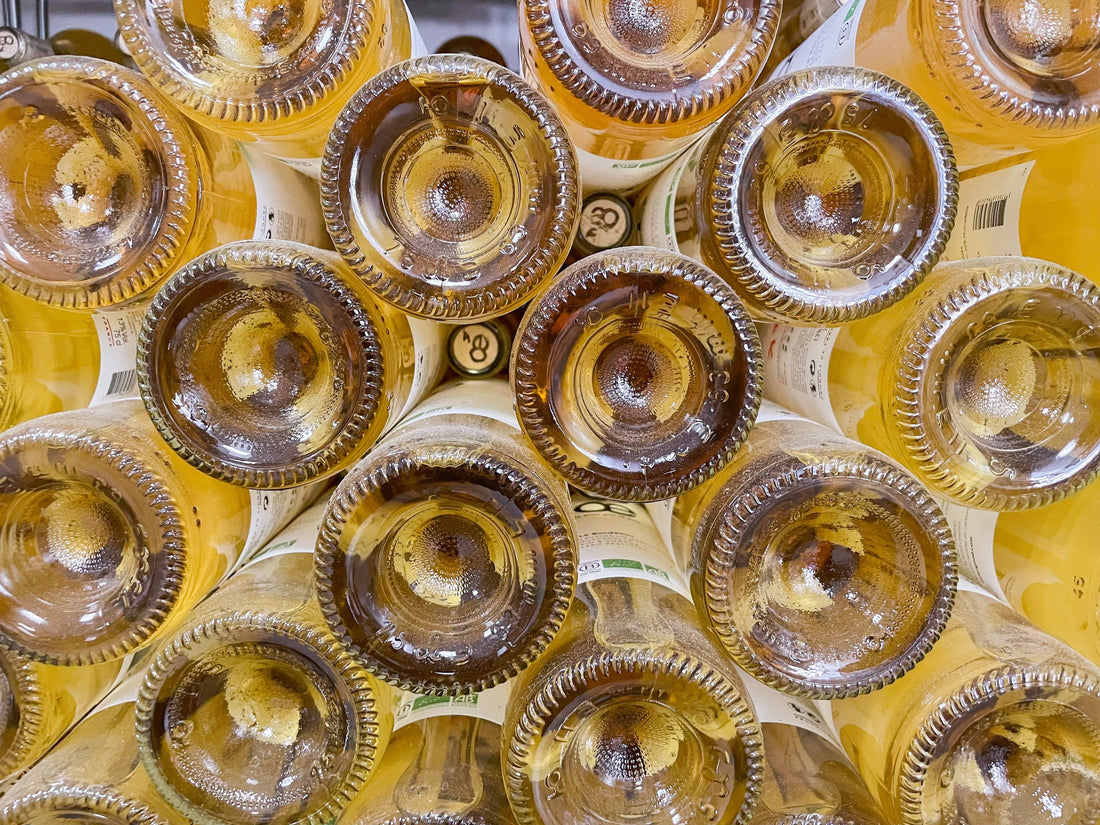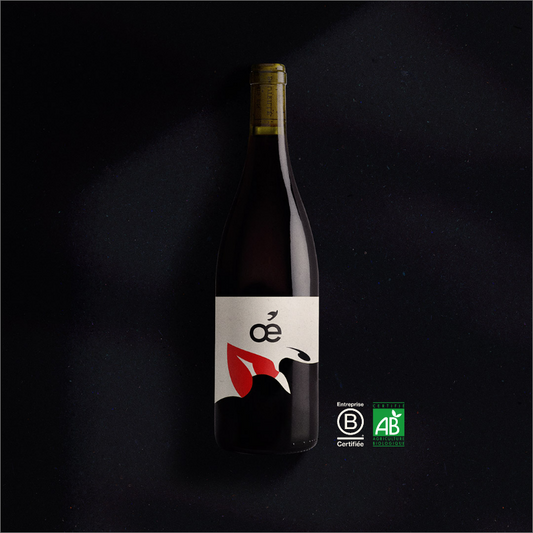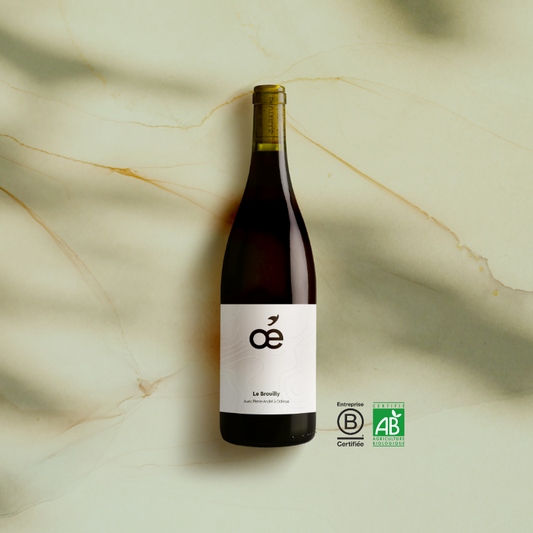Hello everyone,
It's Sophie and Mathilde from Oé! We're respectively in charge of regeneration and logistics at Oé, a duo that made sense to lead our first LCA!
Sami and I have been working for a few months on our life cycle analysis, which involves gathering a lot, a lot of data! Without going into too much detail, LCA allows us to study the impact of a specific product . We chose to do it on our Côtes-du-Rhône red produced by Fabien in Bollène. And to be honest, we are a little frustrated at the end of this exercise... We'll explain !
A little context
Let's start with a few words about Oé, even if you probably already know us if you read us.
Oé seeks to reduce its impacts (and therefore those of its customers) as much as possible:
-
All our products come from organic farming , and this is important when you know that vines represent 3% of French agriculture and 20% of the pesticides used.
-
All our bottles are reusable , and that's a game- changer since nearly 50% of the carbon footprint of wine is linked to the glass bottle.
-
We work as much as possible in zero waste : no caps on our bottles (and yes, the Marianne has no longer been mandatory since 2019) and we offer delivery in returnable crates and caps when the customer's logistics allow it.

Why do a LCA?
To ensure that our actions are going in the right direction, limit our impacts and determine our next challenges, we regularly evaluate our activities to make the right choices.
We already do our carbon footprints with the help of our partner Sami. And we wanted to go further to get out of the carbon tunnel and have a study on the scale of our product . LCA aims to bring us a new perspective and highlight other environmental issues to consider.
How did we actually go about it?
Four months passed between our first meeting with Sami and the delivery of the results, which can be divided into three phases:
Step One: Determine the Scope of the Study
We chose to carry out 3 LCAs with the aim of reporting on the choices made by Oé and being able to compare with more traditional situations.
-
Scenario 1 : an LCA on a standard red wine in a reusable bottle but thrown away and delivered in a cardboard box
-
Scenario 2 : an LCA on a standard red wine in a reused bottle and with zero waste delivery (no cardboard, tape or plastic film, but crates and lids)
-
Scenario 3 : an LCA on an Oé red wine (organically grown) in a reused bottle and zero waste delivery
Step two: collect the data
Since we chose to study an Oé wine, we brought one of our winemakers with us. We wanted to do it on our Côtes-du-Rhône red, one of our bestsellers , so that the study would be as representative as possible. It was with Fabien that we moved forward with the collection (Fabien, if you're reading this, thank you again for your time!).
Mathilde, our external logistics manager, also collected a lot of data:
-
Elements related to the composition and origin of all our primary packaging (glass bottle, label, cap), secondary packaging (crates, boxes, tape) and tertiary packaging (stretch plastic film, cap, wooden pallet)
-
Data relating to winemaking and bottling (inputs and energy used for a 75cl bottle)
-
Data relating to pre- and post-production transport (from the vineyard to Oé, via the bottler and to our customers), namely distances and vehicle types.
Step 3: Interpret the results
…and that’s where we got a little frustrated!
Please note, our LCA is not ISO 14040 because it has not been audited by a third party, which limits our communication about it. At first, we didn't really understand why, but now that we know what goes on behind the scenes of an LCA, we can only validate it as the results depend so much on the reliability of the data...!
Our frustrations
On the agricultural side, the specific data we collected (agricultural inputs, farm size, etc.) could not be used because the level of complexity was too high. This is frustrating after spending time on it!
Grape cultivation is therefore still the same, based on Agribalyse data which does not reflect the transition work carried out by Oé's partner winegrowers.
In particular, work in organic farming is completely invisible ! Even though studies attest to environmental gains thanks to organic practices (up to -50% on carbon!). On this point, we invite you to read this study from ITAB .
Second frustration, the exercise of comparing our results with the Agribalyse average is not easy because we do not know the assumptions made by Agribalyse.
We know that on Agribalyse, the footprint of red wine ( here ) is 1.27 kg CO2e / kg of product or 1.65 kg CO2e / bottle (assuming that a full bottle weighs 1.3 kg), but we do not know the details.
Victories that make us proud and make us want to accelerate!
👉0.63 kg CO2e /bottle .
That's the carbon footprint of our reused wine bottles delivered with zero waste. That's 62% less CO2 than the average ! That's still 8,400 kilos of CO2 for 15,000 bottles, or the equivalent of a round-the-world trip by car. Not bad, right?
👉 Our wines also help reduce our impact on the environment:
-
Oé wines reduce the impact on land use by 33% . This is interesting when you consider that less than 10% of wine-growing soils are in good condition ( Genesis );
-
They help reduce water resource depletion by 68% ;
-
They reduce the depletion of energy resources (i.e. the depletion of fossil resources) by 52%;
-
Our wines limit the ecotoxicity of freshwater aquatic ecosystems by -56% (linked to water pollution by chemicals).

👉 Another point that we found interesting: the transition from classic delivery in boxes to zero-waste delivery (returnable lids and crates) allows us to reduce the carbon footprint of the bottle by 83% , enough to convince our customers to get started?!
And let's not forget that in two years, Oé has managed to reduce the carbon intensity of its bottles by 43% thanks to the deployment of reuse and zero-waste. And we're not going to stop there... thanks to your invaluable help!
👉And you, have you carried out an LCA and wouldn't we pool our results to compare?
👉Also, Mathilde, our logistics manager, welcomes companies wishing to improve their skills in circularity and zero waste in our warehouse… don't hesitate to contact us!
Good day,
Mathilde & Sophie





